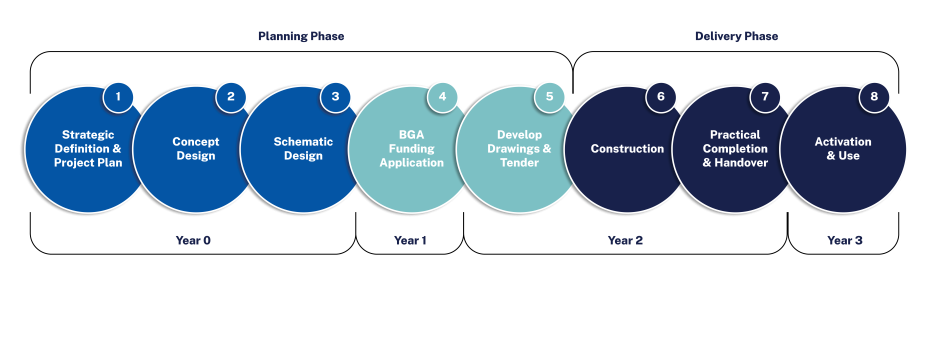Capital Program
The Capital Program allocates funds to support Queensland independent schools to construct educational, boarding and distance education facilities. The funds can also be used to refurbish or convert existing buildings to make them suitable for their intended purposes and to build internal site infrastructure.
Refreshed supporting materials and new tools and resources for the application process are available in the Key Documents section below. An updated revision 02 of the "Navigating the Capital Application Process" document has been provided, including additional cost commentary on common building elements.
Funding sources
The Australian Government Capital Grants Program (CGP) and State Government Capital Assistance Scheme (SCAS) provides funding to eligible independent schools to construct, convert, refurbish and upgrade school facilities.
Each Program/Scheme has its own set of guidelines. While different, each has a similar intent concerning focus and eligibility. There are instances where either Australian Government or State guidelines will dictate how capital assistance will be allocated.
CGP provides funding under the Australian Education Act 2013, the Australian Education Regulations 2023 and the Capital Grants Program Guidelines sets out the detailed requirements applying to the administration of the Program.
SCAS provides funding under the Education (Capital Assistance) Act 1993, the Education (Capital Assistance) Regulations 2025 and the Capital Assistance Scheme Guidelines.
Key contacts
Please contact Gary or Rod regarding the Capital Program
General Manager
Executive Officer
Eligibility
Funding eligibility is based on a school:
-
Being in receipt of Australian Government recurrent funds for the levels of education to which the proposed project relates
-
Having entered into a QIS BGA Participation Agreement
-
Through the application process demonstrate that the:
- Project will contribute to funding guideline objectives and address other Australian Government priorities and objectives for schooling. These objectives and priorities will be highlighted in each funding round
- Proposed project is consistent with sound educational planning, especially in relation to cost, size and use of facilities to be funded
- School remains financially solvent once the project is completed
- School has financial need for capital assistance
- School has an appropriate maintenance plan in place
- School has adequate insurance cover
- School owns the land or has a lease for the land and/or buildings that is at least 22 years from the date of the application
Eligible project types
- Planning, erection, alteration, extension, demolition, conversion or refurbishment of a building, part of a building or other facility
- Development or preparation of land for building or other purposes
- Installation or upgrade of water, electricity or any other services
- Provision of furniture and/or equipment which is part of a broader capital project, unless special circumstances exist
- Providing library materials and goods for cataloguing a library
- Purchase of land with buildings or parts of buildings, or in special circumstances, without buildings
- The provision of modular classrooms
Ineligible projects
- Where retrospective approval is being sought (generally after a contractual arrangement to commence the project has been entered into)
- Facilities of a type not provided by the State in State schools
- Facilities which have religious worship as the principal purpose
- Facilities in a co-educational school which are not equally available to male and female students
- Projects to be undertaken solely by parents and friends
- Facilities where the majority of use will be by full fee paying overseas students, or other unfunded students attending a 'for profit' section of a school
- Facilities that are principally for pre-primary education (for example, an Early Learning Centre attached to a school)
- Facilities related to a temporary site at which special assistance is proposed to be provided by an eligible non-state school under the Education (Accreditation of Non-State Schools) Act 2001
- Projects where a contract has been entered into, or construction including site works, has commenced prior to Ministerial approval, i.e.. where retrospective approval is sought
Application and assessment timeline
Make an application
Applications for the 2026 round Capital Grant Program became available on the 17th of November 2025. Please complete the Request for Application form to request an application.
The application is an Excel-based document and provided by QIS BGA on request from the applicant school and will be accessed via the online Grant Management System.
Important dates
| Applications open: | Monday 17th November 2025 |
| Application Section 1 closes: | Monday 2nd March 2026 |
| Application Section 2 closes | Tuesday 31st March 2026 |
A range of information will be gathered during the application process. Click to view the QIS BGA Privacy Policy and Collection Notice.

Assessment principles and fundamentals
Principles
QIS BGA ensures the assessment of capital applications is in line with the legislation and guidelines provided by the State and Commonwealth Government.
Information on the assessment methodology of the capital application process is available via Navigating the Capital Application Process.
Key Documents
Refer below for a list of key documents supporting the planning, application, delivery and evaluation stages of a capital project:

-
Year 0 - Plan
Develop an understanding of what is required to make a quality capital application via:
Understand the links between time, money and creating value via:
Information on the development of documentation required for a capital application process is provided via:
Note: the below documents are transitioning to a mandatory requirement for the 2027 capital application round and beyond:
Document Requirements 2025 2026 2027 Site Master Plan (any) Desirable Acceptable Site Master Plan
(based on QIS BGA Guide)Highly Desirable Mandatory Sustainability Strategy* Mandatory Mandatory Evidence that demonstrates an approval to develop will be in place by 31 December of the application year Highly Recommended Mandatory * Required when a school is seeking funding for sustainability elements within a proposed capital project
-
Year 1 - Apply
Information on completing the MS Excel capital application is provided via:
- Capital Grant Application - Help Notes
- Capital Grant Application - Help Notes for New Schools (coming soon)
- Capital Grant Application - Frequently Asked Questions (coming soon)
Information on the assessment methodology of the capital application process is explained via:
- *Navigating the Capital Application Process, including:
- Functional Areas and Construction Rates incorporating Furniture, Equipment and Sundry Allowances
- Locality Indices
- Below-the-line Matrix
- Additional Cost Commentary for Common Building Elements *NEW*
*Please note the revised Revision 02 document has now been published to include additional cost commentary for common building elements.
Further supporting information for the completion of Below-the-line costs in the capital application is explained via:
When fulfilling the supporting documentation requirements of the Below-the-line Matrix, the following proformas will be submitted where applicable:
Other supporting documentation requirements may include:
-
Year 2 - Deliver
Development and understanding of capital project delivery via:
- Design, Quality and Delivery Guide (coming soon)
-
Year 3 - Evaluate
Development and understanding of post occupancy evaluation via:
Grant administration
-
Recipient school agreement
For successful applicants, an Agreement will be provided via the GMS by QIS BGA immediately after the advice of Ministerial approval.
-
Funding claims
All Capital Grants will be paid upon receipt of a series of Claim Forms and any other accountability requirements listed in the Recipient School Agreement at the following milestones:
- Payment of 50% of grant amount at 25% project completion (in terms of value)
- Payment of 40% of grant amount at 50% project completion (in terms of value)
- Payment of 10% of grant amount at 100% project completion (practical completion)
-
Accountability
Once the final claim is made, schools will complete documentation provided by QIS BGA, where the schools External Project Supervisor and an Accountant will confirm the project was completed in a manner that conforms to the Approved Project description, the approved plans and that grant monies were spent only on the Approved Project.
-
Recognition
For further information on recognition requirements for Australian or Queensland Government funding, click here.
New School Program
Purpose
Capital Program funds can be used to establish new schools or campuses. New schools or campuses are broken into three categories:
- Mid to large schools
- Small schools
- Schools accredited as Special Assistance Schools, Special Schools or Majority Indigenous and Torres Strait Islander Schools.
Contacts
Before commencing any work on a new school feasibility, Approved Authorities are strongly encouraged to contact the BGA Secretariat. This will help Approved Authorities gain a strong understanding of the funding and assessment approach used for each type of new school.
Funding framework
As new schools are funded under the Capital Program, QIS BGA applies the same arrangements as the Capital Program for the following areas:
- Funding Sources
- Eligibility
- Application and Assessment Timeline
- Assessment Principles
- Grant Administration
The QIS BGA New Schools and Campuses Policy provides guidance for Approved Authorities applying for funding and outlines the process for assessing these applications.


